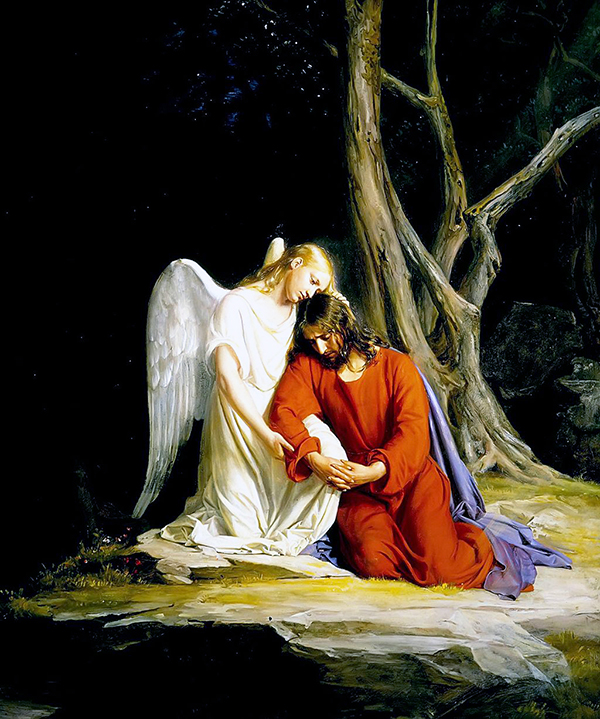On the nakedness and temerity of Job—and ourselves
- JEFFREY MIRUS
One of the most striking passages in all of Scripture is Job's prayer just after he has learned of the destruction not only of his sources of wealth (his beasts of burden and his servants) but also of his ten sons and daughters.
 An angel comforting Jesus before his arrest in the Garden of Gethsemane by Carl Bloch, Public domain, via Wikimedia Commons.
An angel comforting Jesus before his arrest in the Garden of Gethsemane by Carl Bloch, Public domain, via Wikimedia Commons.
Immediately upon hearing all of this bad news, he knelt down and prayed:
Naked I came from my mother's womb, and naked shall I return; the LORD gave, and the LORD has taken away; blessed be the name of the LORD. (Job 1:21)
Moreover, as the sacred writer puts it, "in all this Job did not sin or charge God with wrong" (v.22). But when he then suffered a number of physical ailments as well, and he had to listen endlessly to the reproaches of his so-called friends, Job did make a different sort of mistake, which was a very natural mistake considering all the circumstances: He began to think that God owed Him an explanation.
Unjustified evil?
The Book of Job is generally considered not to be historical, though most Catholic commentators from the earliest period have supposed that Job himself was a real person whose circumstances became in some way legendary. Nonetheless, the book is typically viewed as one of the poetic books of the Bible, and in any case it is clearly intended to serve as an exploration of the problem of suffering, or material and spiritual evil, in light of the sovereignty and goodness of God. Its effectiveness is evident in that the remarkable quotation from the beginning of the book is not the only passage that makes us pause and reflect. There is a great deal to ponder in this book.
The various acquaintances of Job tend to assume that suffering is always the just punishment for particular personal sins. Accordingly, those who visit Job in his distress repeatedly urge him to recognize this fundamental reality, to confess his guilt, and so to be healed. This sort of thinking is common enough in the Old Testament, in that God often appears to punish sinners more immediately and directly than we would expect today. The same mistaken strain of piety runs through various brands of Protestantism, including the prosperity Gospel so often preached by televangelists. But Job continues to suffer while remaining steadfast in professing his own innocence. Therefore, in his frustration with those who offer him false help, he seeks nothing more than to have God Himself answer his questions and judge his case fairly.
A Catholic, of course, ought to recognize this as dangerous territory, having learned that we are all sinners, that none of us can even begin to attain to the goodness of God without grace, and that suffering is redemptive. But this was hardly the dominant worldview in Jewish culture before Christ, which often assumed some correspondence among personal righteousness, prosperity, and happiness in the world, despite a somewhat conflicting awareness of how the wicked themselves often seem to prosper inordinately. In any case, it is precisely this dominant worldview that is explored and ultimately exploded in the Book of Job.
It is the primary purpose of the Book to set Job straight on this very point. Thus, when God finally does appear and speak to Job, he actually mocks Job for his presumption in calling God to account:
Who is this that darkens counsel by words without knowledge? Dress for action like a man; I will question you, and you make it known to me. Where were you when I laid the foundations of the earth? Tell me, if you have understanding. Who determined its measurements—surely you know! (Job 38:1-2)
These are merely the first words of God's speech, occupying chapters 38-41, in which He draws an unequal comparison between Leviathan, whom men can neither understand nor subdue, and Himself, who created Leviathan and all that is. Thus God concludes not that Job is justified before Him but that Job cannot even begin to understand His relationship with God, or God's purposes, or God's justice:
No one is so fierce that he dares to stir [Leviathan] up. Who then is he who can stand before me? Who has first given to me, that I should repay him? Whatever is under the whole heaven is mine. (Job 41:10-11)
To his credit, Job immediately recognizes his own insufferable temerity in demanding an accounting from God:
I have uttered what I did not understand, things too wonderful for me, which I did not know. ... I had heard of you by the hearing of the ear, but now my eyes see you; therefore I repent in dust and ashes. (Job 42:3, 5-6)
Accounting for God
It is noteworthy that Job is not suffering because of his sinfulness; he is quite right about that. The problem with his response to his troubles is that, first, he does not understand the vast gulf of holiness that separates himself from God and, second, he assumes that worldly prosperity ought to be a sign of God's favor and worldly suffering a sign of God's disfavor. So also do his friends and "comforters". The difficulty Job faces is that he knows He has been faithful to God, and so his own integrity forces him to deny his friends' advice to confess his sin and repent. But in the end he realizes that to demand that God explain Himself is a step too far and, being indeed a genuinely righteous man, he suddenly learns humility: He repudiates his sin of speaking about what he does not understand—indeed, his sin of calling God to account in an attempt to plumb mysteries that are far too deep for him.
In Christ, of course, we understand much more, but in Christ we also understand that it is not for us to sit in judgment even on ourselves, let alone on others, or on God. If God's mystery is impossible for us to penetrate, and if also, as the expression goes, a man is a poor judge in his own case, then our attitude to the mystery of God, the mystery of others, and indeed the mystery of ourselves must be characterized by humility before "things too wonderful" for us.
After all, we do know something about sin that neither Job nor his literary creator knew, and it is this knowledge that makes us not representatives of our own personal righteousness but representatives of a very different kind:
So we are ambassadors for Christ, God making his appeal through us. We beseech you on behalf of Christ, be reconciled to God. For our sake he made him to be sin who knew no sin, so that in him we might become the righteousness of God. (2 Cor 5:20-21)
At the very end of the Book, Job's prosperity is renewed and even increased, right down to ten new sons and daughters to replace those whom Job has lost—a sure sign that this is what we might call a primary exploration of the relationship between God and his creatures with respect to the problem of suffering, and not a secondary exploration of the irreplaceable uniqueness of each human person. The Book of Job teaches that what God has done in creating us is beyond our understanding. And when a Christian reads it, he will realize that what Christ has done for us, and what His Church has done for us, are beyond human understanding as well.
These things can only be revealed: They demand not our own righteous conviction that we are worthy before God, as exemplified by Job's insistence in the beginning, but our gratitude for God's unfathomable mercy, as exemplified by Job's repentance in the end.
 This is Meaghen Gonzalez, Editor of CERC. I hope you appreciated this piece. We curate these articles especially for believers like you.
This is Meaghen Gonzalez, Editor of CERC. I hope you appreciated this piece. We curate these articles especially for believers like you.
Please show your appreciation by making a $3 donation. CERC is entirely reader supported.

Acknowledgement
 Jeffrey Mirus. "On the nakedness and temerity of Job—and ourselves." Catholic Culture (February 9, 2024).
Jeffrey Mirus. "On the nakedness and temerity of Job—and ourselves." Catholic Culture (February 9, 2024).
Reprinted with permission from Catholic Culture.
The Author
Jeffrey Mirus holds a Ph.D. in intellectual history from Princeton University. A co-founder of Christendom College, he also pioneered Catholic Internet services. He is the founder of Trinity Communications and CatholicCulture.org.
Copyright © 2024 Catholic Culture



